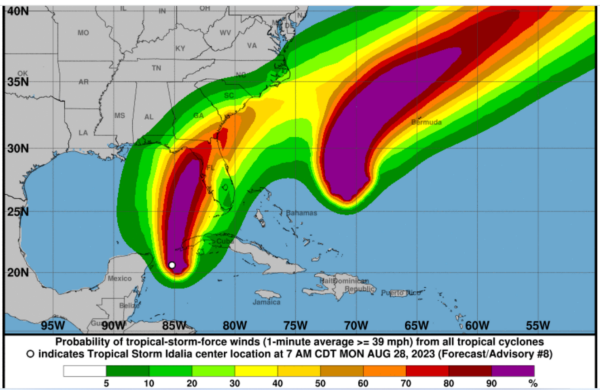Freight News:
What to look out for when hauling FEMA loads
Even as city, state and federal officials urge residents to flee ahead of high winds and flooding, truck drivers answer the call to haul emergency supplies to areas where hurricanes are expected to strike.
However, the way truckers heed that call has a huge impact on when, how and how much they get paid, FreightWaves CEO Craig Fuller points out.
“Hurricane-relief loads offer an opportunity for trucking companies to demonstrate to the public how critical trucking is, regardless of how challenging a mission might be,” Fuller said.
Florida Gov. Ron DeSantis is urging all residents to be prepared as Tropical Storm Idalia approaches the state.
As of Monday morning, Idalia was a tropical storm, but the National Hurricane Center warned that the storm would strengthen into a powerful hurricane before making landfall later this week.

Fuller has some advice for truck drivers considering hauling Federal Emergency Management Agency (FEMA) loads, which brokers advertise at high-dollar rates but often come with some pitfalls.
Years before founding FreightWaves, Fuller ran Xpress Direct, the on-demand emergency unit of U.S. Xpress, from 2002 to 2005. Over the course of his four years dealing with hurricane activity, his division handled in excess of 20,000 shipments and billed over $100 million in revenue in disaster-relief loads alone.
Ahead of Tropical Storm Idalia’s unpredictable landfall, truckers can expect to see lots of loads of bottled water and preparation supplies like plywood, gas cans, duct tape, batteries and flashlights to be sent to prestaging areas, Fuller said.
What to expect when hauling FEMA loads
While trucking demand will increase and rates may soar, it’s important for truckers to ensure that daily detention rates are built into their confirmation sheets, Fuller said. Often it can take days, and sometimes weeks, before trucks are unloaded, which can prove costly if detention pay is not built into a driver’s daily rate.
“This is a big problem for trucking companies if they’ve not hauled FEMA disaster-relief loads before, and some of the brokers that are involved in the process can take advantage,” Fuller said. “They may not pay you detention, which is BS, because the federal government pays the broker detention. They will ask for documentation, but make sure that you get paid for detention because it’s your equipment and you’re the one that’s stuck.”
Be prepared for slow payment
Truck drivers who haul FEMA loads shouldn’t expect to be paid immediately as freight brokers must first submit paperwork to FEMA, which can be a long and exhausting process.
“What I would recommend doing is going in and finding someone that can accelerate your payment, perhaps a quick-pay service or a factoring company that can actually help pay for those freight bills, because if you don’t, you’re going to have problems getting paid,” Fuller said. “Also, get everything in writing: Make sure that you have your confirmation sheets with detention, all of it in writing.”
Prepare for chaos at staging areas
Potentially extended delays in unloading even critical supplies call for some planning as any decision requires the coordination of local, state and federal officials before any freight can be delivered, according to Fuller.
“You will be dealing with government officials, many of whom are not familiar with logistics and don’t understand what it takes to handle such projects,” he wrote in an article posted on FreightWaves.com.
Fuller said drivers should stock up on groceries, prepare for possibly no cellphone service and rely on their CB radios in preparation for long waits. Fueling up prior to entering the prestaging area is critical as many fueling stations are typically closed because of high winds or flooding.
“Hurricane relief is the biggest dog-and-pony show you will ever see in trucking,” Fuller said. “But there is a certain satisfaction in being able to help people who are suffering.”
For detailed forecast information, keep up with the National Hurricane Center here.
The post What to look out for when hauling FEMA loads appeared first on FreightWaves.
Source: freightwaves - What to look out for when hauling FEMA loads
Editor: Clarissa Hawes